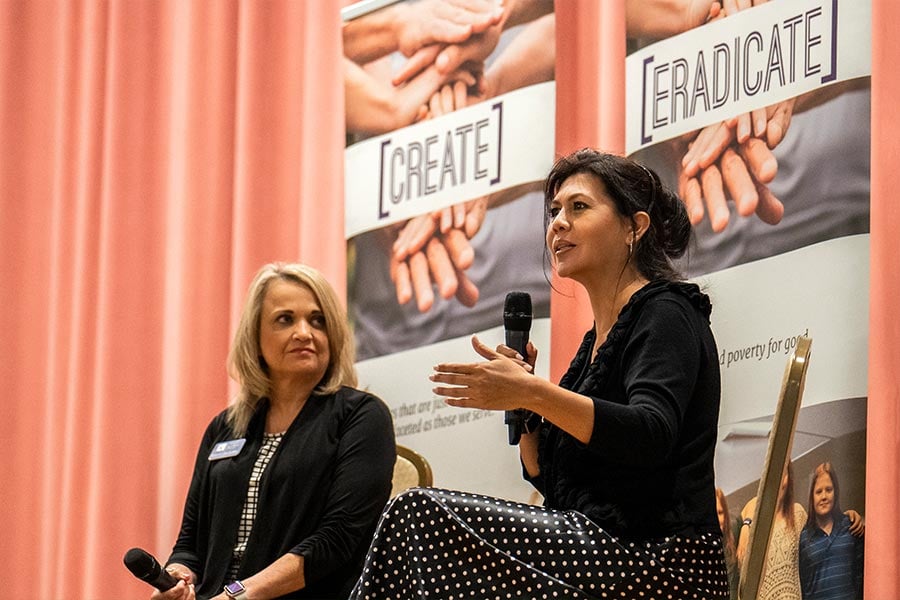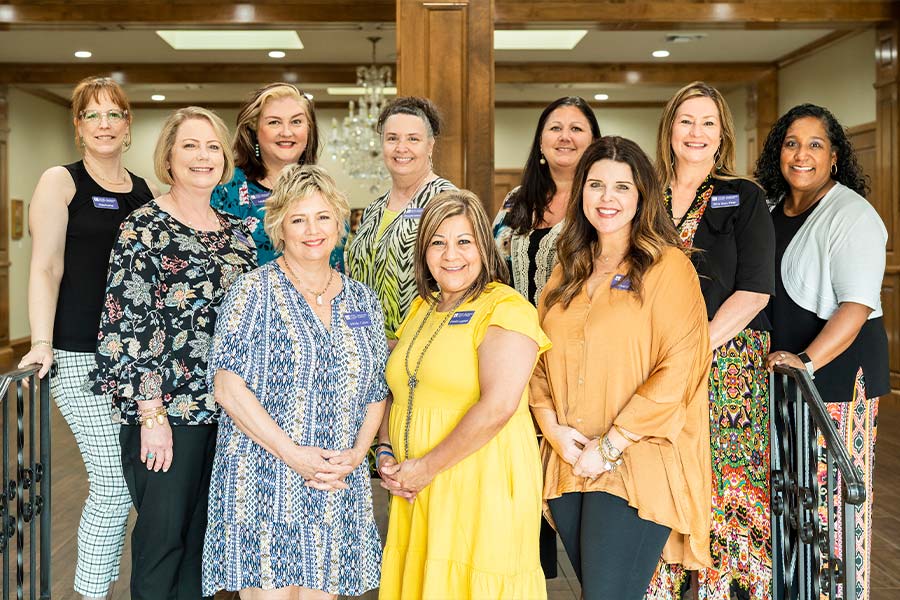Catholic Charities sheds light on poverty at Wichita Falls summit

Elia Moreno, national director of Community Outreach for No Excuses University, addresses the audience during the Fifth Annual Poverty Summit hosted by Catholic Charities Fort Worth Northwest Campus as CCFW Chief Service Officer Ronna Huckaby listens on May 10, 2022. (NTC/Juan Guajardo)
WICHITA FALLS — Poverty goes much deeper and is much more complex than people think at first glance, according to Elia Moreno, an author and expert on poverty.
During her keynote speech at the Catholic Charities Northwest Campus Poverty Summit May 10, she elaborated on lessons she learned about poverty throughout her career in social work and community outreach.
Ronna Huckaby, chief service officer of CCFW, said the Poverty Summit, held in Wichita Falls for the first time since 2018, is about creating awareness and shedding light on misconceptions about poverty.
“Poverty is extremely complex so the more people can talk about it, different points of view, maybe we can get to the finish line,” Huckaby said.
The Wichita Falls Chamber of Commerce cosponsored the event, and Chamber President and CEO Henry Florsheim delivered the welcome as well as information about what poverty looks like in Wichita Falls.
“At the chamber, it’s our mission to build a stronger Wichita Falls — to build a strong community for economic development through business support. I can tell you the biggest type of poverty we see is among the working poor,” he said.
Data from the United Way’s latest ALICE Report indicates that 49 percent of households in Wichita County are below a basic economic survival threshold. ALICE stands for Asset Limited, Income Constrained, Employed — households that earn above the Federal Poverty Level but do not make enough to make ends meet.
“We are seeing an increased number of employed families who are unable to afford the basics — housing, childcare, food, transportation, health care, technology,” he said.
Huckaby added that the Wichita Falls Chamber welcomed Catholic Charities into the community in 2008 with open arms. She wants people in Wichita Falls to know that Catholic Charities Fort Worth Northwest Campus has a variety of programs to meet their clients where they are.
“We have that information referral as well as that individualized, customized approach to assist people in their journey out of poverty,” Huckaby said.
Moreno, who is the National Director of Community Outreach for No Excuses University, said Catholic Charities has been “dear to her heart” since she volunteered with unaccompanied minors at the Kay Bailey Hutchinson Convention Center last year.
“And it was the first agency to arrive as they rushed to get prepared for what they thought would be 600 children and it turned out to be 2,700 children. And Catholic Charities showed up,” she said.

The Wichita Falls team of Catholic Charities Fort Worth (NTC/Juan Guajardo)
Since writing her first book on poverty, Moreno’s goal, as she works in communities across the country, is to extend dignity and love to those she serves.
“Because, like I said, we judge what we don’t understand so my goal is to teach today on the different types of poverty to open people’s eyes, so they are able to see through a different lens.” Moreno said.
Moreno’s presentations on poverty are usually three to six hours long, and she explains them through case studies. On that night, she had less than 50 minutes before a short question-and-answer session. In that time, she went over two types of poverty: generational and situational, although she briefly explained there are 10 other types of poverty.
In the case study she gave on generational poverty, she talked about Dr. Donna Beegle, who has written a book called, See Poverty…Be the Difference.
Moreno described Dr. Beegle’s life: born into a migrant family, at 15 she became a high school dropout who lived in her car with her two living children at the time. Along the way she had five miscarriages. When she tried to get help for housing, agencies required her to go back to school, which she didn’t want to do at first. In fact, Beegle couldn’t even read a newspaper when she restarted her education. Fast forward a few years and she earned her GED. A decade later, she received her doctorate in educational leadership.
Seeing the difficulties that Beegle had in making ends meet in those early years, Moreno asked Beegle why she kept trying to have children. Many people assume that people in poverty have children to get more money from “the system.” But Moreno said clients on average get $67 a month per child, far from the U.S. Department of Agriculture’s projected cost of $12,980 to raise one child in a middle-income, two-child, married-couple family.
Beegle answered Moreno by saying her mother was the most important person in the world to her, and when she had miscarriages, she felt like a failure. She wanted more than anything to be a mother.
“Who am I to say her mother shouldn’t be her role model?” Moreno said.
Moreno continued by explaining that people who are not in poverty often don’t treat impoverished people with the dignity given to them by God because they don’t understand the complexities of poverty or judge them from a distance.
In Beegle’s case, she was considered a “throwaway” by society because of the choices she and her parents made. Beegle was able to achieve her degrees and success because someone saw Beegle as worthy instead of just “judging her and criticizing her,” Moreno added.
“Someone paused long enough to understand that she is created in God’s image too,” Moreno said.
